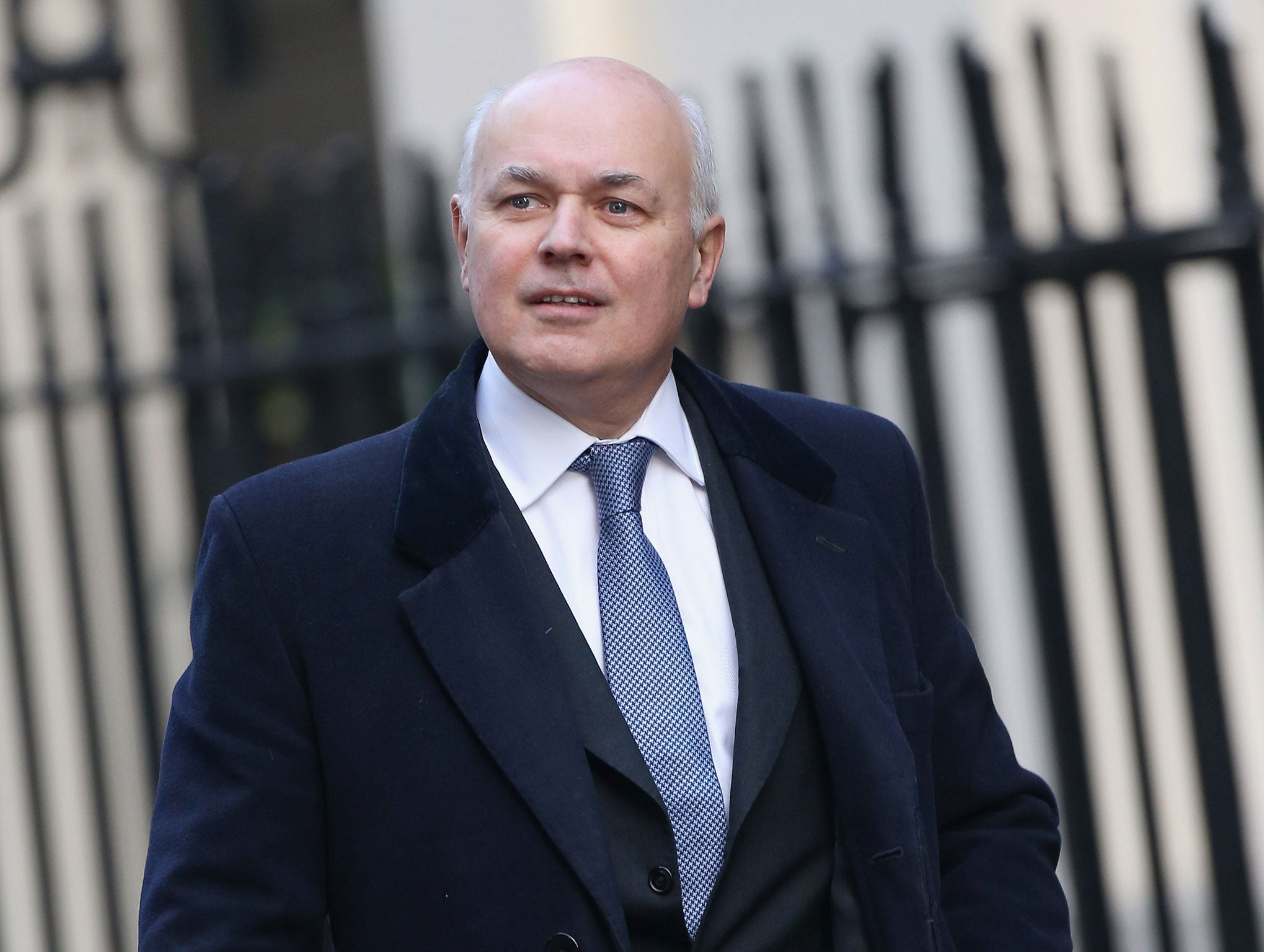The only thing that might save the Government is that the opposition is so poor
Iain Duncan Smith disclosed that his 2017 target for the full introduction of Universal Credit is set to be missed - but Labour aren't quick enough to criticise


Your support helps us to tell the story
From reproductive rights to climate change to Big Tech, The Independent is on the ground when the story is developing. Whether it's investigating the financials of Elon Musk's pro-Trump PAC or producing our latest documentary, 'The A Word', which shines a light on the American women fighting for reproductive rights, we know how important it is to parse out the facts from the messaging.
At such a critical moment in US history, we need reporters on the ground. Your donation allows us to keep sending journalists to speak to both sides of the story.
The Independent is trusted by Americans across the entire political spectrum. And unlike many other quality news outlets, we choose not to lock Americans out of our reporting and analysis with paywalls. We believe quality journalism should be available to everyone, paid for by those who can afford it.
Your support makes all the difference.The failure of Iain Duncan Smith’s Universal Cred scheme (the IT isn’t working) is not new. This morning the Work and Pensions Secretary said: “I do accept, of course, that this plan is different from the original plan.” In other words, the “vast, vast majority” of benefit claimants will be on Universal Credit by 2017 only by redefining the existing welfare system as Universal Credit.
We have known this for some time. Months ago, when the Prime Minister started his “get the barnacles off the boat” phase of simplifying and streamlining the Conservative message for the next election, he told worrywarts that IDS’s welfare reform would be all right in the end - “there’s no need to rush”. In other words, nothing much was going to happen before the election and it wasn’t important to the campaign.
Which means that, of the three big areas of public service reform, two - welfare and the NHS - have been put on a care and maintenance basis. Only in the third - schools - is a plausible reform programme being pursued with vigour and some success. And even that is unlikely to win many votes because most parents see free schools as a distraction from their own children’s interests.
The only thing that might save the Government is that the opposition is so poor. Instead of berating IDS for failing to get more people off welfare and into work, Labour has been stuck on the wrong side of George Osborne’s policy, of capping total benefits at the level of average earnings, £26,000 a year. It is not a reform so much as a symbol, but it is enough to offset the failure of the grandiose folly of Universal Credit, which, because it hasn’t happened, doesn’t really shift any votes.
Labour ought, for example, to have beaten David Cameron to saying that the dole should not be an option for under-25s. It could have been done in a non-punitive way, by saying that it is in no one’s interest to be Neet (Not in Education, Employment or Training), and that Labour would offer every young person a good Eet option.
Ed Miliband’s approach has been to bleat about the cost of living. That’s fine, but it is something that oppositions do to fill the time between their main themes. Instead it is the main theme and will vanish like breath on a window next year when wages start rising faster than prices.
Labour could have been using this time to criticise IDS, Jeremy Hunt and Michael Gove for the failure of public service reform. It was extraordinary that Cameron allowed IDS and Andrew Lansley to bring two grandiose follies of system-wide structural reform. Universal Credit has done little harm, but so much effort, money and time has been wasted in the NHS, the ill effects papered over only by maintaining the high levels of spending achieved by the Labour government.
Hunt has so far kept up the remarkable feat of keeping the NHS out of the headlines, ably assisted by Miliband’s strange decision to keep Andy Burnham in post as shadow health secretary. That means that any attempt by Labour to exploit what should be one of its strongest subjects - the people’s religion as handed down by St Clem and St Aneurin - is cut off mid-sentence by the phrase, “Mid Staffs.”
On schools, of course, it is harder for Labour to oppose. Gove is explicitly playing to the opposition’s weak spot by claiming to be more Blairite than they. Even the telegenic Blairite Tristram Hunt, who replaced the diffident Blairite Stephen Twigg, seems unable to find a way round this rather obvious ploy. It should not be so hard. All Hunt has to say is that he welcomes Gove’s progressive intentions, but he is doing it all wrong. He should accuse him of focusing too much on free schools and on converting existing schools into academies, when the best thing the Government is doing is continuing the Labour policy of setting up new academies in disadvantaged catchment areas. And he should bang on about raising standards in the teaching profession, which the unions, thinking there’ll be more money in it for their members, will be happy for him to do.
David Cameron would be very happy not to fight the election on public service reform. Labour shouldn’t let him.
Join our commenting forum
Join thought-provoking conversations, follow other Independent readers and see their replies
Comments